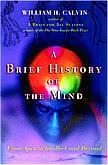|

2005 - announced as Einstein Year
- marks the centenary of the publication of Albert Einstein's equation E
= mc2. To mark this occasion, Sandy Starr at spiked
and science communicator Alom Shaha have conducted a survey of over 250
renowned scientists, science communicators, and educators - including 11
Nobel laureates - asking what they would teach the world about science
and why, if they could pick just one thing.
 |
William
H Calvin
affiliate professor of psychiatry and behavioural sciences at
the University of Washington
in Seattle
We construct reality in our heads, and many things
do not hang together properly, as in our dreams - full of
people, places, and occasions that do not fit together very
well. We take great pleasure, when we finally succeed in
assembling a picture, where everything seems just so. While a
crossword or a jigsaw puzzle has just one correct answer, we
often guess at how more complex things hang together - gossip is
often about guessing from a few facts - and we never realise
that we are wrong.
Scientists are always guessing at the big picture that might
emerge from our scraps of evidence. We make mistakes -
astrology was one of them - and we learn from these mistakes.
But scientists usually doubt their constructions of their
scattered facts. Or if they do not doubt their constructions,
then their competitors are sure to do so. We keep trying to
disprove a pretty picture, at the same time as we try to
embellish it. Gradually, our construction of reality gets better
underpinnings, and we become more sure that it is correct. Call
this scepticism, or the search for truth - it is what gives
proper scientific explanations their good reputation, in a world
full of less coherent explanations.
William Calvin is author of books including
A Brief History Of The
Mind: From Apes To Intellect And Beyond (buy this book from
Amazon (UK) or
Amazon (USA)), and A
Brain for All Seasons: Human Evolution and Abrupt Climate Change
(buy this book from
Amazon (UK) or
Amazon (USA)). See his
website. |
The Virtual Index for my books and articles,
far better than my printed index in most cases:
And my favorite source for looking up
other authors' books (and who has quoted them):
|

A Brief History
of the Mind, 2004

A Brain for All Seasons
2002

Lingua ex Machina
2000

The Cerebral Code
1996

How Brains Think
1996

Conversations with
Neil's Brain
1994 |







